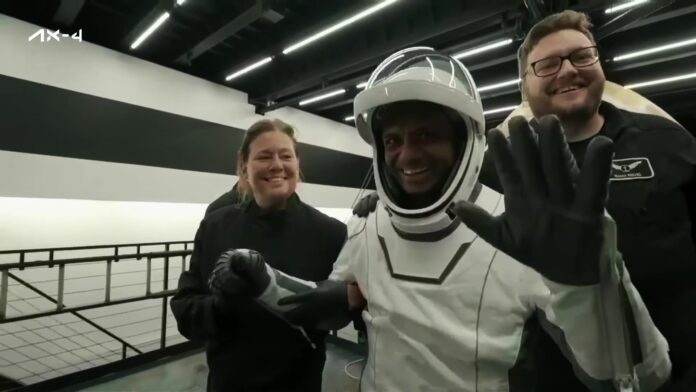Indian Air Force Group Captain Shubhanshu Shukla returned safely to Earth on Tuesday after completing a historic 18-day mission aboard the International Space Station (ISS), marking a major milestone in India’s space journey. Shukla, part of Axiom Space’s Ax-4 mission, became the first Indian to visit the ISS and only the second Indian to enter space since Rakesh Sharma in 1984.
SpaceX’s Dragon spacecraft “Grace,” carrying Shukla and three international astronauts, splashed down in the Pacific Ocean off the California coast at 3:01 p.m. IST (4:31 a.m. CT). The crew had boarded the spacecraft at 3:30 a.m. CT (2:00 p.m. IST) on Monday, following the conclusion of their stay at the orbiting laboratory.
The safe return triggered emotional celebrations in Shukla’s hometown of Lucknow, where his family was overwhelmed with joy and pride. “We’re extremely overwhelmed with emotion knowing that our son has returned to Earth,” said his mother, Asha Shukla. His sister, Shuchi Mishra, called the moment surreal, adding, “I couldn’t sleep last night, we were just waiting for this moment.” His father, Shambhu Dayal Shukla, thanked God and the nation, saying, “He has returned from a place where there was little chance of coming back.”
Union ministers and space officials hailed the return as a proud moment for the country. “India has now firmly established its place in the global space domain,” said Union Minister Jitendra Singh. Defence Minister Rajnath Singh posted on X, calling Shukla’s journey a “proud stride for India’s growing space ambitions.” Union Minister Hardeep Puri added that the mission paves the way for future Indian odysseys to the Moon and beyond.
During his mission, Shukla orbited the Earth over 310 times, covering approximately 1.3 crore kilometers, a distance equivalent to 33 trips to the Moon. He and his crewmates also witnessed more than 300 sunrises and sunsets from orbit.
The Axiom-4 crew included US astronaut Peggy Whitson, Poland’s Slawosz Uznanski-Wisniewski, and Hungary’s Tibor Kapu. Shukla was selected for the private spaceflight as part of India’s growing collaboration in commercial and international space missions.
ISRO has termed Shukla’s experience aboard the ISS as “extremely valuable” for the upcoming Gaganyaan human spaceflight programme. “His time on the ISS will contribute immensely to the mission planned over the next two years,” said Nilesh M Desai, Director of the Space Applications Centre, ISRO.
Shukla and the Ax-4 team will now undergo a post-flight rehabilitation programme lasting about a week, helping them readjust to Earth’s gravity under medical supervision.
As the country celebrates Shukla’s successful return, officials and citizens alike see the mission as a springboard for India’s space ambitions. “It is a proud moment for every Indian,” said his father. “This journey was made possible by the efforts of the government and the blessings of all fellow countrymen.”





